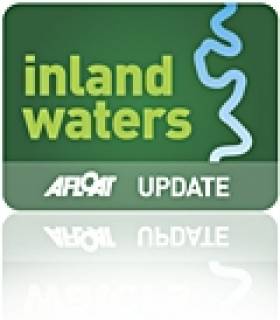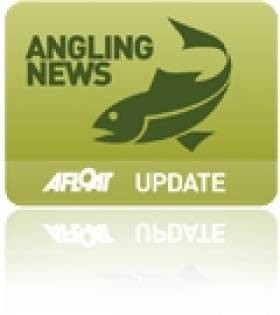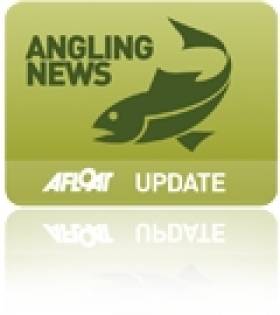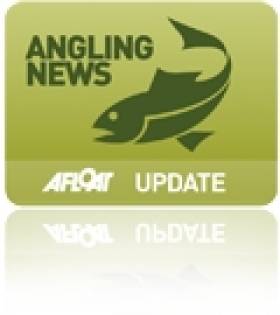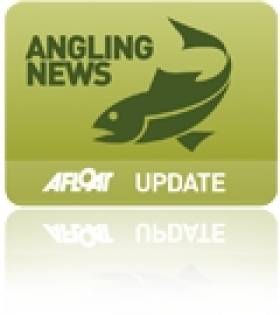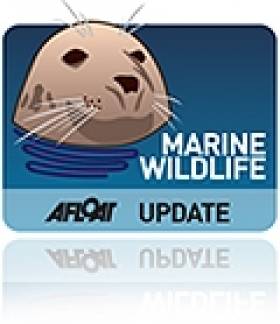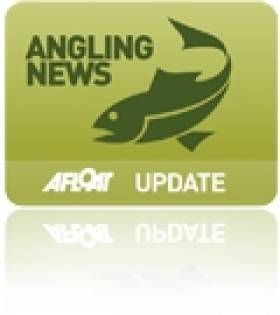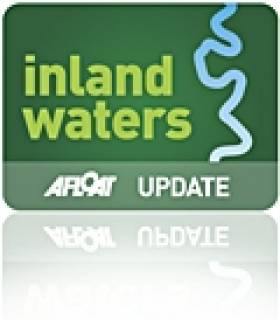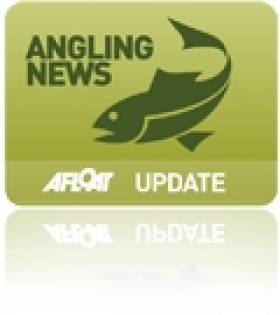Displaying items by tag: angling
Concern Over Fish Kill on Co Cork River
#INLAND WATERWAYS - Fisheries environmental officers at Inland Fisheries Ireland received reports of a fish kill in the Kiltha River in Castlemartyr, Co Cork from anglers late on Saturday 11 August last.
The investigation which initiated early the following morning revealed that many thousands of brown trout fry, parr and adults, salmon fry and parr, brook lamprey, stickleback and stone loach were killed.
The fish kill affected a 5.5km section of the Kiltha River from Mogeely downstream to its confluence with the Dower River.
The Kiltha River is an important salmonid spawning and nursery tributary of the Womanagh River which flows east into the sea at Youghal Harbour. This fish kill is particularly disappointing as the Womanagh River, which is currently closed to salmon angling, had been responding well to management and has seen its fish populations increase over the past several years.
The effects of the pollutant which entered the river were quick-acting, indicating that the pollutant was of a toxic nature.
Inland Fisheries Ireland is awaiting test results of water samples to determine the nature of the pollutant. While this analysis is taking place IFI’s investigation into the cause of the kill is continuing with several potential sources being examined.
The news comes just weeks after reports of fish mortalities along a 9km stretch of the River Vartry in Co Wicklow.
Members of the public are reminded that Inland Fisheries Ireland operates a confidential 24 hour hotline and suspected illegal fishing or pollution can be reported to 1890 347 424 or for easier recall 1890 FISH 24.
Shark 'Attack' of a Different Kind in Cork Harbour
#ANGLING - Known as the 'wolves of the sea', blue sharks haven't yet been showing in numbers off Cork Harbour, but a number of them surprised a group of anglers recently.
Donie Geary of the angling boat John Boy tells Cork Harbour Angling Hub that he was taking out a group of UK anglers in an area north of the Ling Rocks in a calm Saturday morning.
The boat put out a shark trace using mackerel, bran and fish oil as bait, but as Geary says, he wasn't optimistic about their chances, especially with the low numbers of mackerel.
Meanwhile, the group enjoyed a morning and afternoon of bountiful bottom fishing, forgetting about the shark rods, when "one of the ratchets screamed off".
That one was a false start, Geary explains, but the next one was hooked - and after "about 30 minutes of gentle coaxing on 30lb braid" they landed an impressive 60lb blue.
A few more scraps with the marine predators later and an even bigger 80lb specimen was landed and photographed before release.
Here's hoping this 'shark attack' is a good omen for more blues in Cork coastal waters this year.
Cork Harbour Angling Hub has more on the story HERE.
Dublin Tackle Shop Undertakes National Bass Survey
#ANGLING - Henry's Tackle Shop in Ballybough is conducting a countrywide survey to determine the extent of the decline of bass activity around Ireland's coastline.
According to the shop's Henry Lynam and Pat Daly, the last two years have seen some unusually low bass activity on many coasts.
As part of their national survey, they are asking anglers to return log book pages to measure the quality of the bass fishing across Ireland this year.
"Bass are a species protected by by-laws," they wrote on their blog. "The quality of protection afforded by these laws has varied but have mainly been sufficient to help the stock recover from a serious crash in the 1980s to a reasonable level over many years.
"We fear now that with the double edged sword of financial stress increasing the number of poachers and decreasing budget for fisheries protection that perhaps bass are coming under pressure again."
Other factors they note include the year's weather extremes and the large and the unusual northward movement of local plankton.
"Whatever the cause we can only observe and record the resulting facts for presentation to someone who is in a position to act."
The warning comes as calls are being made to reopen Ireland's bass fisheries for commercial fishing. Anglers are asked to return their bass angling log book pages at the end of the bass fishing season to Henry's Tackle Shop, 19 Ballybough Road, Dublin 3.
#ANGLING - Entries close next Friday 17 August for the Lakelands & Inland Waterways World Pairs Angling Championship, taking place from 10-14 September in Monaghan, Leitrim, Cavan and Fermanagh.
Described at the world's richest coarse angling competition by the Leitrim Observer, entries have so far being received from throughout Europe and as far afield as Brazil and Australia, all aiming for a share of the £60,000 (€76,500) prize fund.
The 150-pair limit is close to being reached, but organisers are establishing a reserve list to ensure all spots are filled for the biggest contest of its kind in Ireland.
Organisers are calling it "a match run by anglers for anglers" - all competitors have to do is catch as many bream and roach as they can, and all methods can be fished.
Test fishing has already been hosted on inland waterways throughout the four counties that comprise the cross-border Lakekands & Inland Waterways region, based on the Erne system, the Shannon-Erne Waterway and the main Shannon navigation, to find the best five spots for world-class wild angling.
The event is sponsored by Lakeland & Inland Waterways, a marketing and product development initiative of Waterways Ireland, Fáilte Ireland, Tourism Ireland, Fermanagh Tourism, the Northern Ireland Tourist Board and Shannon Development.
Double Court Win for IFI Over Illegal Boyne Salmon Fishing
#ANGLING - Inland Fisheries Ireland (IFI) has successfully won two court cases for illegal salmon fishing on the River Boyne in 2011.
In the first case Arunas Butkus of Navan, Co Meath was fined €3,000 for illegal salmon angling and ordered to pay total costs of €1,395 to IFI in Navan District Court on 25 July last.
On 15 November 2011, Butkus was found to be fishing during the annual close season for salmon on the River Boyne. Fisheries officers Fionnuala McCabe, Val Woods and Kevin O’Brien from the Drogheda District apprehended him, whereupon an incorrect address was provided.
Butkus was not represented in court. Judge McMahon convicted him under Section 137 of the 1959 Fisheries Act for fishing out of season and under Section 301 for refusing to give his name and address when lawfully demanded. He was fined €3,000, given six months to pay and ordered to pay total costs of €1,395 to IFI.
In the second case, Anthony McDonagh was fined €150 for fishing without a salmon licence and ordered to pay total costs of €1,650 to IFI in Drogheda District Court on 12 July last.
On 22 September 2011, McDonagh was found to be fishing without a salmon licence on the River Boyne. He was apprehended by Assistant Inspector Kevin O’Brien and Fisheries Officer Val Woods whereupon he gave a false name and address.
McDonagh pleaded guilty and Judge Flann Brennan convicted him under Section 303 of the 1959 Fisheries Act for failing to produce a licence on demand and under Section 301 for refusing to give his name and address when lawfully demanded. He was fined €150 for fishing without a rod and line and ordered to pay total costs of €1,650 to IFI in Drogheda District Court.
According to IFI, the River Boyne was was once one of the most prolific waterways for salmon on the east coast. In the 1980s approximately 10,000 salmon ran the systemm, but this declined to an all-time low in 2006 when fewer than 1,000 were caught on the river.
In 2006 IFI introduced a series of conservation measures in order to combat the decline in salmon numbers. The interceptory mixed stock fishery for salmon ceased throughout Ireland and netsmen who availed of the Hardship Scheme were duly compensated for their loss of the salmon fishery.
Consequently all the rivers on the east coast with the exception of the River Fane were closed for salmon fishing. The River Boyne is open for catch and release only and in 2011 a total of 824 salmon were caught and released on the river.
IFI said it hopes these measures will preserve our stock of Atlantic salmon, which are "not only a valuable resource for our economy, but also an important part of our natural heritage as salmon and trout have been running our rivers since the last ice age".
Anglers and the general public are also urged to be vigilant and report any incidences of illegal fishing via the IFI's special freefone number at 1890 34 74 24, or for easier recall 1890 FISH 24.
Algal Bloom Killing Fish, Shellfish Off West Coast
#MARINE WILDLIFE - An algal bloom off the west coast of Ireland is responsible for significant fish and shellfish kills from Galway to Donegal, according to the Marine Institute.
As The Irish Times reports, as much as 80% of stocks have been affected on Donegal oyster farms, and the bloom is also impacting negatively on angling tourism in the west and northwest.
The algae responsible, karenia mikimotai, occurs naturally in Ireland's coastal waters during the summer months and his harmless to humans, but contains a "toxic irritant" that damages the gills of fish, shellfish and other marine species.
Low-level samples were first detected in May but in the last two weeks it has grown into a dense bloom from Donegal to Mayo, with high levels now being recorded in Galway Bay, according to the Marine Institute's Joe Silke.
"In Donegal the bloom was so dense that there were many reports of discoloured red or brown water in some areas and several areas have reported dead marine life washing up on the shoreline, requiring local authorities to close certain beaches,” he said.
"The bloom affects species that live on or near the sea bed so we are seeing flatfish, lugworms and some shellfish getting washed up on the beaches."
The image evokes memories of the notorious 'red tide' that killed wild fish and shellfish along the west coast in 2005.
Meanwhile, the Marine Insitute said there are "some indications" that the bloom may be moving back out to sea, as observed in the latest satellite images and modelling data.
"However, cell counts of samples analysed in the Marine Institute... show that the bloom is still of the same density in the Donegal and Sligo regions as it was last week."
Body Found in Search for Missing Angler Off Valentia Island
#MISSING FISHERMAN - Search teams combing the coast off Valentia Island for a missing fisherman have this afternoon found the body of a man, according to the Irish Examiner.
A major search operation was launched last night after the 32-year-old angler slipped and fell into the water while fishing with a group of seven at Culloo Rock off the Co Kerry island.
Garda and Naval Service divers this afternoon joined the search, which resumed at 6am headed by the Valentia lifeboat and Kingstown coastguard unit, with assistance from the Waterford-based Irish Coast Guard rescue helicopter.
The body recovered by divers has not yet been identified.
Lifeboat operations manager Richard Foran said the area is notorious for people losing lives, as the Belfast Telegraph reports.
"It's a fantastic fishing, spot but the problem is it is exposed to the Atlantic," he said.
Biosecurity Initiative at Trout Fly Angling World Cup
#ANGLING - Inland Fisheries Ireland has teamed up with the committee behind the World Cup Trout Fly Angling Championship to develop a biosecurity initiative for the contest, taking place on Lough Mask from 2-6 August.
The premier event in the angling calendar will be contested by up to 500 keen fly fishermen from Ireland and abroad, each anticipating lifting the coveted World Cup.
The anglers that fish this competition realise the true gem that Lough Mask represents, providing quality angling in clean, unpolluted waters.
Towards that end, the biosecurity initiative aims to prevent non-native invasive species and harmful aquatic pathogens being inadvertently introduced into the lake on angling equipment.
Central to the initiative is that all anglers must disinfect their landing nets and boots each day before registering for the competition.
Anglers will be requested to co-operate with stewards on each morning and to bring their landing nets and boots with them to the registration centre. There, they will dip their gear in supervised disinfection tanks and receive a stamp from the Biosecurity Steward to show that they have used the facility.
Only anglers who can show this stamp to the Registration Officer will be registered to fish the competition on that day.
In recent years, despite considerable effort on behalf of IFI and many other angling and conservation groups, the non-native invasive Zebra mussel was introduced to Lough Mask.
Invasions elsewhere in Ireland's inland waterways include the notorious Asian clam, which has taken residence from the River Shannon to the Grand Canal.
The present biosecurity initiative - which follows the recent launch of a smartphone app to identify and report aquatic invasive species - represents an effort to make anglers aware of the dangers posed, and to alert them to the fact that other harmful and environmentally damaging invasive species are present on the island of Ireland, and that these can be inadvertently introduced to the lake on wet nets or soiled boots.
Information packages relating to the threats posed by invasive species will be available to anglers’ during the competition.
Strange Goings On As Turtle, Carp Appear in Royal Canal
#INLAND WATERWAYS - The Irish Times recently reported on some strange and unusual findings along one of Ireland's longest inland waterways this summer.
Angler Tony Masterson was more than a little surprised to discover he had caught a red-eared slider turtle in the Mullingar section of the Royal Canal last month.
The 30cm turtle is of a species native to the southern United States, so is presumably an abandoned pet - a cause of concern as the number of invasive species in Ireland continues to expand.
Inland Fisheries Ireland (IFI) senior scientist Joe Caffrey reminded the public that it is "illegal to release any species that is not normally resident in Ireland into the wild" and added that the IFI "will continue to monitor the canal to ensure this is a once-off case".
Curiously, a wild salmon was caught the same stretch of canal last year.
It's thought that the salmon entered the canal via the water supply system from Lough Owel, which is connected to the Shannon by the River Inny.
IFI officers have also confirmed the sighting of a koi carp in the Royal Canal, which "appears to be in good condition".
Melting Glaciers A Factor in Irish River Salmon Decline
#ANGLING - Climate change in the Atlantic may be a significant factor in the decline of wild salmon returning to their native rivers in Ireland - especially with the news that a section of ice twice the size of Manhattan has calved from a glacier in Greenland.
Angling correspondent Derek Evans writes in The Irish Times about the major ice sheet separation along the north-west coast of Greenland, which experts have attributed to warming ocean temperatures.
It is the second such indident to occur in the past three years, after the Petermann glacier lost some 97 square miles of ice in August of 2010.
As reported on Afloat.ie last year, the effects of climate change on the world's oceans are forcing species such as wild salmon to adapt by feeding in colder waters.
The Irish Times has more on the story HERE.


























